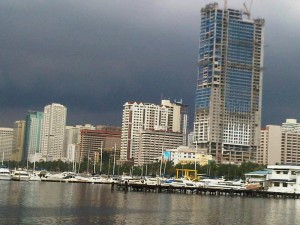
Growth in the Philippines this year is expected to be higher than the rest of the countries in the region, the IMF said in its latest report. PHOTO BY RICK ALBERTO
MANILA, Philippines—Growth in Southeast Asia is expected to slump this year as the region struggles to keep up with the recovery of the rest of the continent, a new report by the International Monetary Fund (IMF) said.
The IMF said in its World Economic Outlook, released to coincide with its Spring Meetings in Washington this week, showed growth might slump in major economies in the Association of Southeast Asian Nations (Asean).
The so-called Asean-5, made up of Indonesia, Thailand, Malaysia, Philippines and Vietnam, are expected to grow by an average 4.9 percent and 5.4 percent in 2014 and 2015, respectively. This would be slower than all of Asia’s expected 5.4 percent and 5.6 percent expansion for both years, respectively.
Smaller emerging and developing markets in Asia, meanwhile, are seen growing by 6.7 percent in 2014 and 7.1 percent in 2015.
“Developments in the [Asean] economies will remain uneven,” the IMF report read.
The Philippines will be among the few countries expected to stand out in the region, where growth is expected to remain strong. “Malaysia and the Philippines … are on a more positive trajectory, and growth is expected to remain robust in both countries,” the IMF report said.
Growth in the Philippines is expected to be higher than the rest of the region’s, the IMF said. The Philippine economy is expected to grow by 6.5 percent in 2014 and 2015. The IMF’s projection for the country is in line with the forecast it came out with at the conclusion of its Article IV visit to Manila last month.
Last year, the Philippine economy expanded by 7.2 percent, faster than the official target of 6 to 7 percent.
The IMF’s forecast for this year is within the government’s growth target of 6.5 to 7.5 percent for 2014. For next year, the projection is below the official target of 7 to 8 percent.
The IMF said Indonesia’s growth was projected to slow this year as subdued investor sentiment and higher borrowing costs weigh on the domestic economy, although the currency depreciation since mid-2013 should give exports a lift.
In Thailand, the near-term outlook remained slowing as private demand weakens and public investment plans are delayed.


